Hello!
I thought I'd try my luck here, as I do not have access to a dermatologist.
I've had acne for 6 years. It's been cystic at some points, but I've never had any treatment for it.
I have it on my neck, chest, back, shoulders and lower back too.
I used to shave my whole body for no reason, which is probably what caused and aggravated most of the body acne - though I'm not sure.
I also have broken blood-vessels and redness around my cheeks and nose.
These pictures were taken a few weeks ago when it was pretty calmed down. (Bathroom light ![]() )
)
I had applied a few drops organic Jojoba oil, which has helped a bit, that's why my skin is a bit shiny.
There's quite a bit of scarring under the redness of my left cheek, but it's not as apparent in these photos.
I just left it alone all this time thinking it would go away on its own without treatment, as many people (and doctors) told me.
I'm not sure what to do at this point. Can anyone give me some advice?
Female, 20.
I do not use makeup.
/Hanna
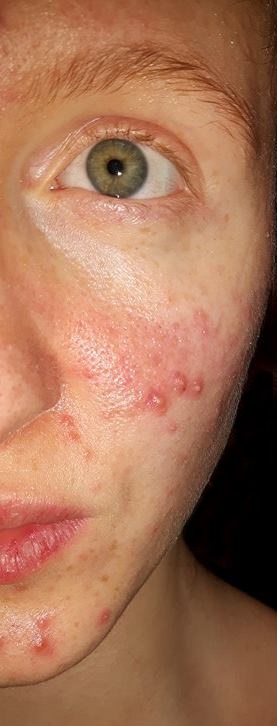
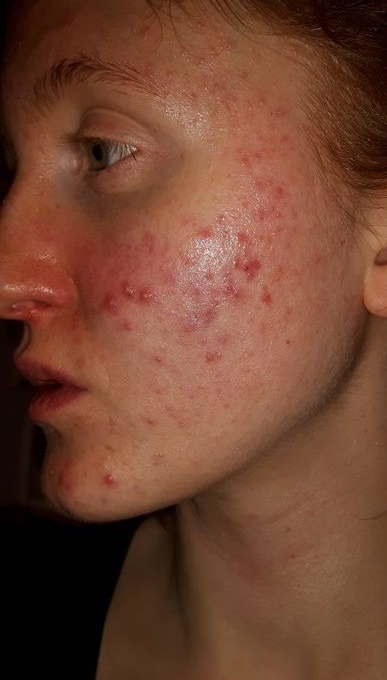
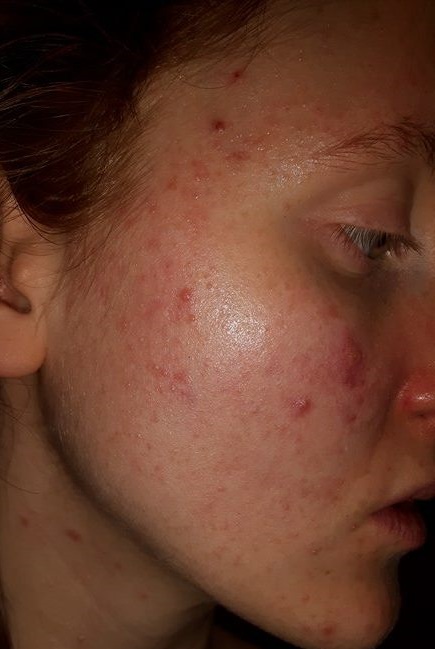
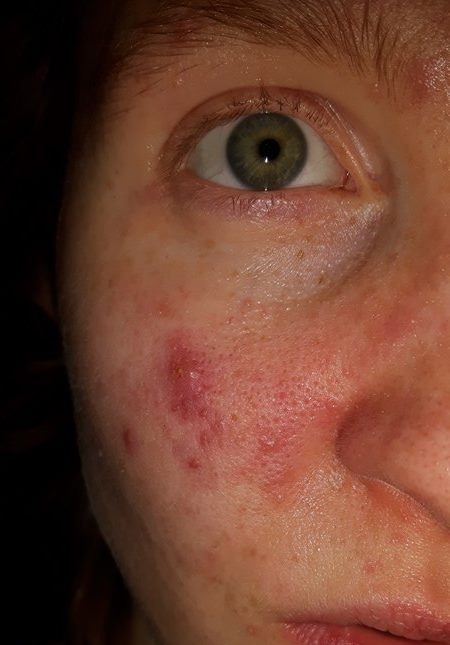
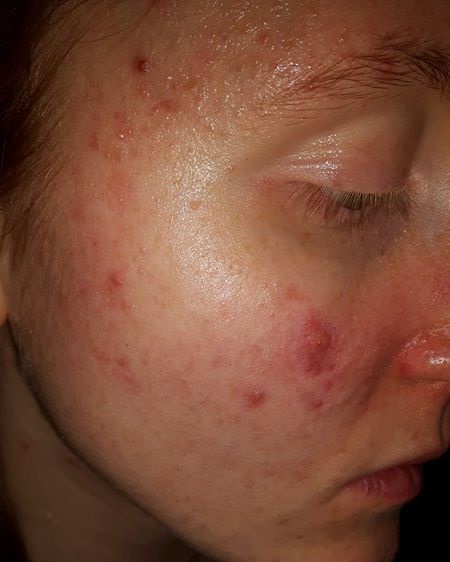
See a dermatologist. You'd be a good candidate for accutane, especially if this is all over your body.
I get cystic acne on occasion and suffer from clogged pores and hormonal acne. I do NOT use jojoba oil, I've found it clogs pores and breaks me out more. I use vitamin E oil.
55 minutes ago, JessieLeigh said:See a dermatologist. You'd be a good candidate for accutane, especially if this is all over your body.
I get cystic acne on occasion and suffer from clogged pores and hormonal acne. I do NOT use jojoba oil, I've found it clogs pores and breaks me out more. I use vitamin E oil.
I have a lot of allergies and it seems that accutane contains things that I'm allergic to.
I have Argan oil too, I'm not actually 100% sure which one I applied at the time.
My face itches when I've used them though, so I'm probably better off not using them at all.
Noted! Which brand of vitamin E oil would you recommend or does it not matter?
Acne.org will tell you to keep up with it, but honestly it's a sign that your skin is irritated. I would stop and advise you to do fruit face masks. It's cheaper and better for your skin. I tried many products and this natural regime works the best and my skin is loving it. I never seen my skin this live and youthful. I had a problem with dead skin build up and it's taken care of that. Here's the recipe, you will need a blender and I would use organic fruits. I usually use frozen fruits so it'll never spoil. I transfer some to the fridge so it'll defrost.
mango, pineapple, papaya, blue berries, blackberries, strawberries, apple, carrots and banana and 1/2 lemon squeezed in there.
banana is natural moisturizer, mango, papaya and carrots have great vitamin a content which is the main ingredient for retin - a. Strawberries have natural ahas, it also has vitamin c that is vital for skin repair cause it promotes collagen. Papaya is a great skin lightner. Best of all, all of them are full of antioxidants. Antioxidants are great for inflammation, and detoxifying toxic pollution. It's non irritant unless I are allergic to some of the fruits but that's highly unlikely. Along with a good diet this should eliminate acne. Give it a shot. It make your pimples come to a head and then dry and fall off. Apply this and leave on for 30-1hr everyday a little will last 3 days.
It may not be the case specifically for you, but oils can actually aggravate acne.
I used cold pressed organic almond oil for just 3 days and my face turned from clear to full of breakouts. I have my Master's in biochemistryand did an investigation to figure out why I had such reaction. It turns out, many people are sensible to oils, while some people they help to heal acne.
I posted my review but itisn't public yet. It's a bit long, you can skip very scientific parts:
Many people use oils (ideally cold pressed organic 100% pure) as a replacement of skincare. Yes, such words as organic, all natural, full of vitamins and minerals sound really good and people leading organic lifestyle propagate the usage of those.
You know, there are oils that can clog your pores. They do so by increasing follicular hyperkeratosisan increased production of keratin in hair follicles. Over time, this leads to clogged follicles and comedones. Thus, oils with the low comedogenic score are safe to use. This is nothing Im going to talk here about.
So, what are these beloved avocado, rosehip seed, grape seed, hemp seed, olive, safflower, coconut, etc oils?
Well, 60% of each are fatty acids. Among these, in the vast majority of cases, 95% are linoleic and oleic acids.
Thus, oils are concentrated chemical solutions.
Linoleic acid (18:2) is scaled by NFPA 704 as level 2 hazard to health (0-4), meaning intense or continued but not chronic exposure could cause temporary incapacitation or possible residual injury (e.g. diethyl ether, ammonium phosphate). The next point on the scale is this one: 3 - short exposure could cause serious temporary or moderate residual injury (e.g. liquid hydrogen, carbon monoxide, calcium hypochlorite).
Oleic acids (18:1) is scaled 1 by HMIS: - exposure would cause irritation with only minor residual injury (e.g. acetone, sodium bromate).
Safety data sheets in chemical/biochemical labs state:
Adverse Human Health: Material may be irritating to the mucous membranes and upper respiratory tract
Effects and Symptoms: May be harmful by inhalation, ingestion, or skin absorption. May cause eye, skin, or respiratory system irritation.
Indeed, 1 of 2 people is sensitive to even organic cold pressed natural oils and develop the worst irritation and breakouts they have ever had in their lives even because of low or non-comedogenic oils.
WHY? WHY ARE THEY SO IRRITATING TO SOME PEOPLE AND WHY DO THEY MAKE OTHERS SKIN VERY SOFT AND SUPPLE?
Answers hide in the nature of fatty acids and how they act when applied topically.
Studies show that even micromolar concentrations of palmitic (C16, saturated acid) and oleic acids incorporate into the sarcoplasmic reticulum membrane (an inner cell organelle, surrounded by lipid bilayer) and reduce the content of phospholipids in the membrane. (Leo G et all, 1983)
A consequence of enhanced skin permeability and/or toxicity with fatty acids is increased transdermal water loss (lauric, oleic acids). The intercellular lipids (permeate through the whole membrane) have an important function in maintaining the barrier to water permeation through the skin and for holding water in the skin, removing of intercellular lipids produced chapped and scaly skin. Maximum permeation enhancement was observed for fatty acids of 9 to 12 carbon atoms and for fatty alcohols of 10 to 12 carbons. Among saturated fatty acid, the maximum enhancement was shown by lauric acid (C12). (M. Loden at all, 2000)
Remember, when tests say the maximum or elevated score they dont say other substances scored 0, as permeation ability was shown for many other fatty acids, as myristoleic, palmitoleic, linoleic, oleic, lauric and many others.
Lets be clear. The skin permeation effect of fatty acids indeed depends on the chain length and saturation. But the thing is oils do not contain very short fatty acids or contain only trace amounts of those (chains of very very short fatty acids are too short to incorporate into the lipid bilayer, therefore didnt show irritation reactions). Also, its not the deal with a specific membrane, as all of them have the same basis.
In an irritation test in nude mice, 10% oleic acid caused severe irritation. Oleic acid was also evaluated in guinea pigs, with 5% producing significant epidermal damage. Various fatty acids have been examined in humans by applying for 3 h under occlusion using concentrations 0. 16 M. Oleic acid resulted in an elevated score and visible erythema and edema. (M. Loden, 2000)
Another study shows linoleic acid produced significant irritation on human skin (Michael A et al, 1975).
Also, prior studies on the relative irritancy of free fatty acids revealed the saturated C8 to C14 fatty acids and a C18 unsaturated fatty acid to be the most irritating. Another study says that among saturated free fatty acids from C3 to C18, and unsaturated C18 free fatty acids that were applied daily under occlusive patch tests to human skin until detectable erythema appeared, the most irritating fatty acids were C8 through C12. Of the unsaturated fatty acids tested, only linoleic acid produced irritation ( it was the only tested, though).
Also, notice that different tests evaluated different fatty acids and therefore one can say the most irritating was this acid/only this acid showed irritation, while an another test names different acid due to different samples included. Studies say they applied oils until the detectable erythema occurred, thus erythema occurred in all applied saturated fatty acids. Among these, they evaluated the most irritating samples.
SO WHY OILS ARE SUCH GOOD CARRIERS?
All people say oils are good natural carriers of vitamins and minerals to the skin. Oh yes, they are very good carriers, as they disrupt lipid bilayer ( a membrane that surrounds our cells) incorporating in it and therefore make it easier for other substances to penetrate through it.
But our skin is not designed as frogs skin, which consumes near 10% of oxygen within it. Our skin is a barrier, nourished by minerals, vitamins and fatty acids, etc. supplied by blood, thus there is no need to disrupt the natural barrier in order to deliver minerals and vitamins topically.
But even people that develop skin irritation and breakouts can safely consume different types of oils. Even mice like food flavoured with oil more. Whats the secret behind it? The thing is our digestive tract has a layer of mucus that protects it, also it regenerates really fast and digests all sort of organic compounds starting from our mouth.
WHY DO SOME PEOPLE DEVELOP IRRITATION AND OTHERS NOT?
Lets look at one example. There is a compound called PTC (phenylthiocarbamide). It has an extremely bitter taste. Evolution gifted us an ability to detect bitter tastes because at the most cases bitter means toxic. So, when you can distinguish many bitter substances, you have better chances of survival.
But turns out that we vary in the ability to taste PTC and among different nations and populations only certain amount of people can taste it (from 16% to 40%). But it doesnt mean for those who cant distinguish the taste, its beneficial and they can eat it without consequences.
The same is with topical irritation. Not everyone develops the reaction, but it doesnt mean its beneficial for those (we are not talking about allergies here, just irritation!)
Most people experience some sort of reaction after some time of continuous application, as irritation may be induced by repeat disturbance of barrier function, which results in acne and infection.
Maybe you also wonder how oils helped some people to battle acne (especially oil cleansing method) It turns out, they arent sensible to the mechanism in which fatty acids act. Okay, fatty acids act the same on their skin, they just dont develop a visible reaction to it. Thus, fatty acids could dissolve makeup traces that can irritate their skin, or dissolve natural sebum that clogs pores and not to cause irritation by itself.
WHY DO PEOPLE BELIEVE USING OILS TOPICALLY IS GOOD FOR SKIN?
1. People are leaded by the fact that linoleic acid is a natural component of human sebum.
Lets investigate.
Triglycerides and fatty acids, taken together, account for the predominant proportion (57.5%), followed by wax esters (26%) and squalene (12%). The least abundant lipid in sebum is cholesterol, which with its esters, accounts for the 4.5% of total lipids. (Greene RS et all, 1970)
Linoleic acid (18:1) and oleic (18:2) are only less than 15% (there are also different linear monounsaturated acids with 18 carbons) of all fatty acids (they are 57.5% of sebum), thus less than 9 % of sebum are linoleic and oleic acids (B. Boughton et all,1959)
Its not healthy smearing concentrated fatty acids on your skin, even though its produced by sebaceous glands in some quantity naturally. Most people imagine human sebum as a blend of fat and some small amount of water. Its not like this at all.
Think about this: we can obtain not only oils from seeds but cyanide too. It will be 100% natural and organic, but would you smear it all over your skin? (the toxicity isnt relative, but Its just an example that not everything obtained from plants are good for health).
Indeed, human sebum is a unique substance, that can maintain itself when supplied with essential by blood (by the food we eat).
It is unique in particular, the pathways leading to the formation of lipids, which are typically sebaceous, such as branched fatty acids and fatty acids with unshared unsaturation positions: features unique to sebum are the branched chain fatty acids and lipids with the particular pattern of unsaturation. 6 desaturase enzyme (fatty acid desaturase-2) catalyzes a sebaceous-type reaction of desaturation that leads to particular compounds, unique to human6 desaturase preferentially converts palmitic acid (16:0) to sapienic acid (16:1, 6), which is unique to the human sebum and represents ca. 25% of the total fatty acids. Elongation of sapienic acid by 2-carbon unit and further unsaturation leads to the formation of sebaleic acid (18:2, 5,8), which is also peculiar of human sebum. (Ge L. et al, 2007).
We cannot deliver fatty acids that are synthesised only by human cells topically.
2. People that dont develop any kind of visible bad reaction experience very soft, hydrated skin.
Of course, skin is soft after continuous application of oils, as they disrupt elastic membranes and make skin very supple in that way.
There is one Polish saying co bagato, to niezdrawo, meaning when there is too much of something its not healthy. Even though vegetable, seed, nut oils are all natural this doesnt mean they can replace human sebum and can be used safely on the skin. We have a need in linoleic acid, but mainly in our food or some severe conditions that demand the topical application of oils (can be helpful for people that dont develop visible irritation).
I would recommend seeing a dermatologist because your acne could be hormonal, but if that is entirely out of the question..
What products are you using right now?
Try sleeping on either a clean pillowcase or clean towel every night, and make sure you are drinking a lot of water.
I would personally avoid using any oils at the moment, especially since a lot of them are comedogenic.
18 hours ago, paigers said:I would recommend seeing a dermatologist because your acne could be hormonal, but if that is entirely out of the question..
What products are you using right now?
Try sleeping on either a clean pillowcase or clean towel every night, and make sure you are drinking a lot of water.
I would personally avoid using any oils at the moment, especially since a lot of them are comedogenic.
I'm trying to get ahold of one. Hopefully before summer is over!
At the moment all I've got is Avene Thermal Spring Water, and Shea Butter that was given to me by a friend because they had gotten an extra jar. I feel like I really need a sunscreen, because these days I'm just hiding under long-sleeved clothing and hats.
I'm trying to save up money to be able to afford actual products in the near future. Do you have any recommendations?
I switch my pillowcases as often as possible. I only have 4 of them and they have to be hand-washed, so I usually switch after 2 or 3 nights. I could probably switch more often though! Towels are too rough on my curls and turn my hair into a frizzy mess, so I'd rather not do that ![]()
I drink about 1-2 litres of water per day, I carry a gigantic water bottle around everywhere. Haha! ![]()
Okay! I was most likely going to stop anyway because of the itchiness... Which I probably should've done after the first time I used it. That's what I usually do.
On 5/19/2017 at 8:44 PM, H-a-n-n-a said:Hello!
I thought I'd try my luck here, as I do not have access to a dermatologist.
I've had acne for 6 years. It's been cystic at some points, but I've never had any treatment for it.
I have it on my neck, chest, back, shoulders and lower back too.
I used to shave my whole body for no reason, which is probably what caused and aggravated most of the body acne - though I'm not sure.
I also have broken blood-vessels and redness around my cheeks and nose.These pictures were taken a few weeks ago when it was pretty calmed down. (Bathroom light
)
I had applied a few drops organic Jojoba oil, which has helped a bit, that's why my skin is a bit shiny.
There's quite a bit of scarring under the redness of my left cheek, but it's not as apparent in these photos.I just left it alone all this time thinking it would go away on its own without treatment, as many people (and doctors) told me.
I'm not sure what to do at this point. Can anyone give me some advice?Female, 20.
I do not use makeup.
/Hanna1
I am Really for you ...first of all, if this acnes on everywhere on your body then I recommend you to do an allergic test. Also, if it's not a regular acne then please visit once a demonologist. You can also try home remedies methods. I hope it helpful.
17 hours ago, H-a-n-n-a said:I'm trying to get ahold of one. Hopefully before summer is over!
At the moment all I've got is Avene Thermal Spring Water, and Shea Butter that was given to me by a friend because they had gotten an extra jar. I feel like I really need a sunscreen, because these days I'm just hiding under long-sleeved clothing and hats.
I'm trying to save up money to be able to afford actual products in the near future. Do you have any recommendations?
I switch my pillowcases as often as possible. I only have 4 of them and they have to be hand-washed, so I usually switch after 2 or 3 nights. I could probably switch more often though! Towels are too rough on my curls and turn my hair into a frizzy mess, so I'd rather not do that
I drink about 1-2 litres of water per day, I carry a gigantic water bottle around everywhere. Haha!
Okay! I was most likely going to stop anyway because of the itchiness... Which I probably should've done after the first time I used it. That's what I usually do.
I'm sure a dermatologist visit will be worth it!
If you're spending time outside definitely invest in something with SPF. I use Cerave AM Moisturizing Lotion With SPF30, and it seems to work well on my skin but it does contain niacinamide that some people can have a sensitivity to. Niacinamide is great for reducing redness though.
Sun exposure is actually known to be a cause for breakouts in some people, and also makes redness or scarring darker and more difficult to heal, so be careful out there!
Do you know if your breakout started before or after you started using your current products? Has it been getting better or worse?
As far as products go, trying something with benzoyl peroxide may help treat any active spots.
On 5/19/2017 at 8:14 AM, H-a-n-n-a said:Hello!
I thought I'd try my luck here, as I do not have access to a dermatologist.
I've had acne for 6 years. It's been cystic at some points, but I've never had any treatment for it.
I have it on my neck, chest, back, shoulders and lower back too.
I used to shave my whole body for no reason, which is probably what caused and aggravated most of the body acne - though I'm not sure.
I also have broken blood-vessels and redness around my cheeks and nose.These pictures were taken a few weeks ago when it was pretty calmed down. (Bathroom light
)
I had applied a few drops organic Jojoba oil, which has helped a bit, that's why my skin is a bit shiny.
There's quite a bit of scarring under the redness of my left cheek, but it's not as apparent in these photos.I just left it alone all this time thinking it would go away on its own without treatment, as many people (and doctors) told me.
I'm not sure what to do at this point. Can anyone give me some advice?Female, 20.
I do not use makeup.
/Hanna
For hormones the best!
nettle and red raspberries leaves steep and drink at least 1 cup a day
drink buttermilk or kefir at evenings 1 cup
drink herbal teas like this;
chamomile, milk thistle, burdock, mint, thyme, lavender
you will see great improvement (be careful with hormonal drugs and herbs together)
take vitamin D3 if you are inside most of the time
also take vitamin E and flaxseed oil inside
wash face with cleanser at night only
dont use scrubs they will spread acne more
Eat soups everyday it's really good for gut